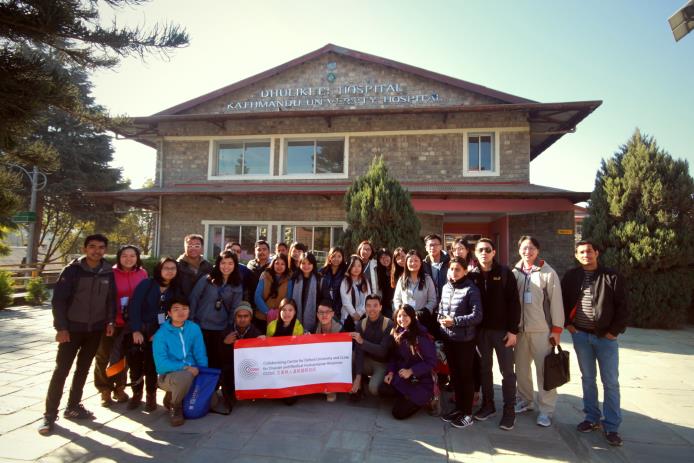CCOUC deployed a team of 23 trainees and trainers from varied academic backgrounds to Nepal to conduct field training programme on humanitarian and disaster preparedness on 2-8 January 2018. The team visited not only the village affected by the dual earthquakes in 2015 to conduct health interventions, but also serval local medical organisations as well as NGO to get to know about their emergency relief and recovery efforts in the post-disaster phase and their work in community healthcare.
A one-day training workshop “Public Health Challenges in Asia in the 21st century” was held on 3 January. The training consisted of 8 sections. Representatives of NGOs, hospital management and academia from both Hong Kong and Nepal shared their opinions and experiences on humanitarian and disaster preparedness as well as public health challenges. Around 40 participants attended the seminar with active participation, including local students who had enrolled in CCOUC online courses.
The team also visited Dhulikhel Hospital, the training hospital of Kathmandu University, to understand the operation of a local community hospital. After the earthquake, a triage system was introduced to the emergency unit to classify conditions into red, yellow or green levels based on their conditions and urgency. The red level is the most urgent and requires immediate treatment. The health centre run by Dhulikhel Hospital continued to provide basic clinic, dental and body checks services for patients from nearby villages. Oral rehydration solutions were also distributed for free in the centre.
The team later visited the remote rural Majhigaun village in Sindupalchok, northeast Nepal. On arrival, the team first assessed the health status of the villagers using household survey. The team was divided into three groups; each group was responsible for one of the three topics of health intervention: menstrual health hygiene, water management & preparation of ORS, and preparation of disaster bags. The health interventions were conducted in the public area of the village, where more than 100 villagers attended with active participation. After the event, the team conducted post-intervention survey with the participants to assess the effectiveness of the interventions.
Thanks to the academic seminar and field visits in the training trip, trainees from different backgrounds can equip themselves with knowledge of public health discipline. Through the process of familiarising themselves with the collective relief and recovery efforts by various stakeholders and organising health interventions and research in the field, the team can understand the needs of the villagers in rural areas, hence identify measures to fill the gaps in building up resilience at community level.
